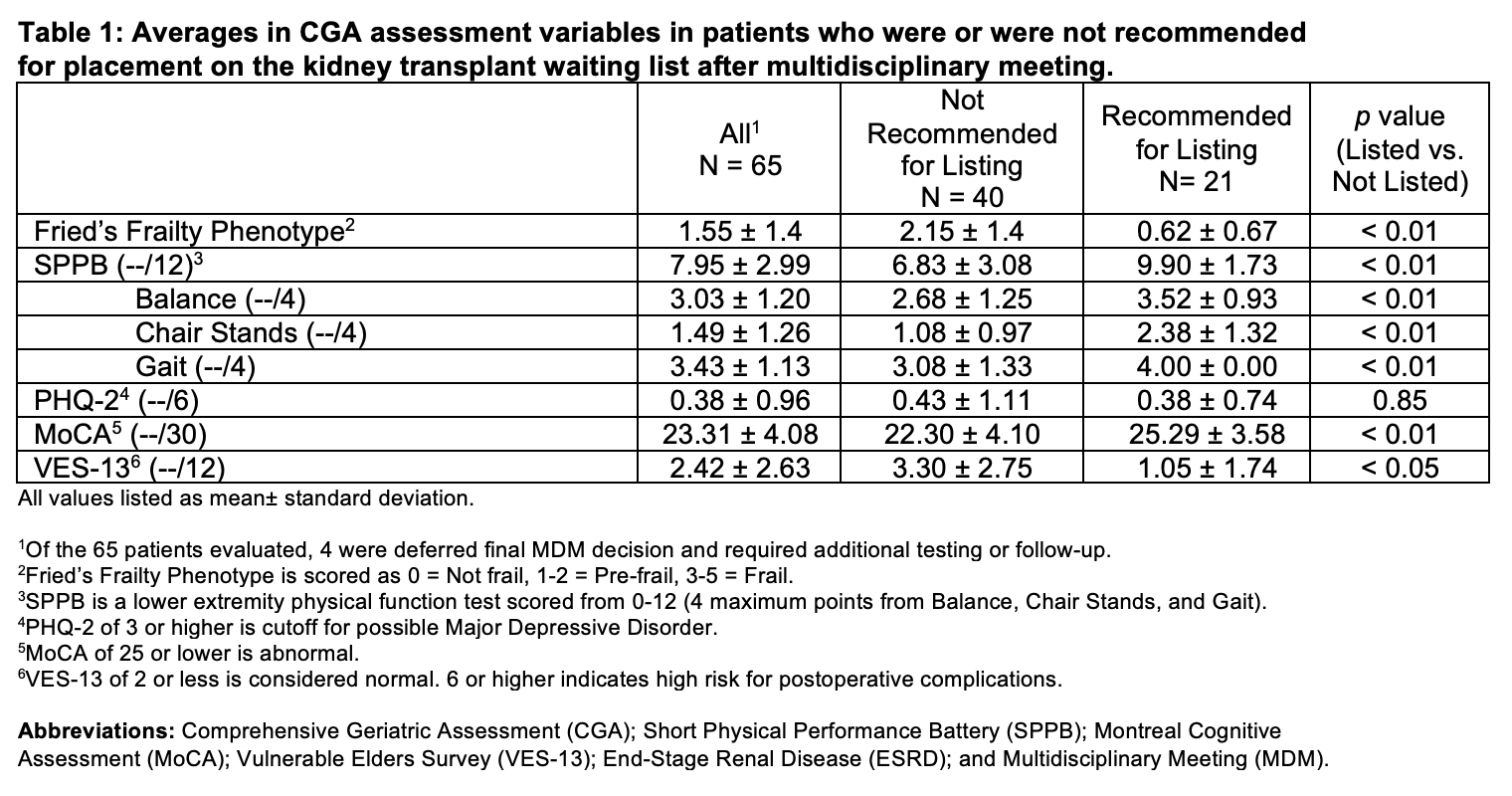Does Comprehensive Geriatric Assessment Impact Risk Assessment for Potential Kidney Transplant Patients?
1Pritzker School of Medicine, University of Chicago, Chicago, IL, 2Medicine, University of Chicago Medicine, Chicago, IL, 3Surgery, University of Chicago Medicine, Chicago, IL, 4Anesthesia, University of Chicago Medicine, Chicago, IL, 5Medicine, Massachusetts General Hospital, Boston, MA
Meeting: 2022 American Transplant Congress
Abstract number: 1740
Keywords: Age factors, Graft failure, Risk factors, Surgery
Topic: Clinical Science » Kidney » 50 - Health Equity and Access
Session Information
Session Time: 7:00pm-8:00pm
 Presentation Time: 7:00pm-8:00pm
Presentation Time: 7:00pm-8:00pm
Location: Hynes Halls C & D
*Purpose: The clinical impact of the components of a comprehensive geriatric assessment (CGA) on kidney transplant decision making in older adults has not been investigated.
*Methods: This was a single-center retrospective review of patients with end stage renal disease (ESRD) who underwent a CGA assessment kidney transplant candidacy evaluation between 1/11/18 – 4/8/21. All patients ≥65 years old and those under 65 with any team member concern for the presence of a possible geriatric syndrome were referred for a CGA evaluation. The CGA assessment included the Short Physical Performance Battery (SPPB), Fried’s Frailty Phenotype (FFP), Montreal Cognitive Assessment (MoCA), Vulnerable Elders Survey (VES-13), and PHQ-2 assessments. Multinomial logistic regression model was used to determine the association between each CGA assessment and the multidisciplinary team recommendation (MDM) for listing.
*Results: 65 patients aged 31-84 (mean 68.1) years underwent a baseline CGA evaluation. 33.8% were female and 47.7% were Black. 21 (32.3%) patients were recommended for kidney transplant whereas 40 (61.5%) were not; 4 (6.2%) required further evaluation. SPPB (OR 1.84, 95% CI 1.30-2.64) and MoCA (OR 1.25, 95% CI 1.06-1.48) predicted MDM recommendation for renal transplant (p ≤ 0.01) while FFP (OR 3.30, 95% CI 1.70-6.37) and VES-13 (OR 1.55, 95% CI 1.14-2.12) predicted MDM outcome of not listing (p ≤ 0.05). No patient with ≥2 falls in the past year or a SPPB balance score of <4 was recommended for listing. 15/21 (71.4%) waitlisted patients underwent kidney transplant; all had an overall CGA rating of “Excellent” or “Good.” 8/15 (53.3%) had postoperative complications, including 3 graft complications and 3 surgical site infections. Mean length of stay was 5.43 ± 2 days, and all were discharged to home.
*Conclusions: Overall CGA rating (SPPB, MoCA, Fried’s Frailty Phenotype, VES-13 scores, fall history) is associated with MDM recommendation for renal transplant in older adults with ESRD at our local institution. Further study is needed to determine whether CGA assessment can predict post-transplant outcomes.
To cite this abstract in AMA style:
Patel J, Hussain S, Mills D, Edobor A, Walters E, Williams J, Kyeso Y, Fung JF, Barth R, Rubin D, Huisingh-Scheetz M, Martinchek M, Madariaga ML. Does Comprehensive Geriatric Assessment Impact Risk Assessment for Potential Kidney Transplant Patients? [abstract]. Am J Transplant. 2022; 22 (suppl 3). https://atcmeetingabstracts.com/abstract/does-comprehensive-geriatric-assessment-impact-risk-assessment-for-potential-kidney-transplant-patients/. Accessed February 9, 2026.« Back to 2022 American Transplant Congress

